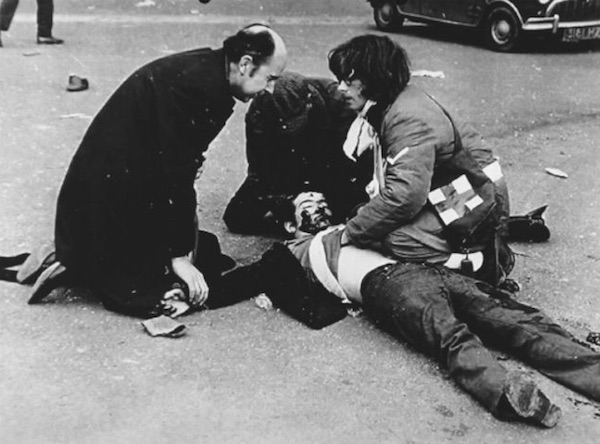
A move by the British government to halt prosecutions for any and all crimes committed by the British Crown forces in the North of Ireland has provoked widespread shock and anger.
The plan for new legislation, leaked to the mainstream British media, will deny justice to victims and survivors of state-sanctioned violence and British collusion. It is being seen as a flagrant violation of the 1998 Good Friday Agreement and a cover-up of British state atrocities and war crimes on a massive scale.
As decades have passed with broken promises, the British government’s actions have never been truly investigated or the perpetrators held accountable. Now a broad amnesty is rumoured to be flagged in the Queen’s Speech on Tuesday, when a new legislative programme is due to be outlined.
The details of the plan are still unclear. The day before the reports emerged, a high-level meeting involving British Direct Ruler Brandon Lewis and the 26 County Foreign Affairs Minister Simon Coveney made no mention of it.
Dublin government officials were said to have been “blindsided” by the development, even after warnings were made to London about unilateral actions on legacy issues. They described the cynical manner in which it was leaked to London-based journalists ahead of elections in Britain as a “kick in the teeth”, according to reports.
The 26 County Taoiseach Micheál Martin said the plans would be a “breach of trust”. Sinn Féin’s Michelle O’Neill described them as “legal protection for those involved in state murder”, while Denise Mullen of Aontú said that it proved that “in the North, British justice means no justice.”
Legal experts have said the action would violate the 1998 Good Friday Agreement, an international treaty. It would also formally abandon the pledges on legacy given in 2014’s Stormont House Agreement, some of which resurfaced in last year’s ‘New Decade, New Approach’ deal.
The announcement is also set to coincide with the verdict of the inquest into the 1971 Ballymurphy massacre, in which eleven civilians were murdered by British paratroopers. Their families, who have waited more than half a century of justice , now face the possibility of having their hopes crushed, just as they glimpse the possibility of justice.
Among the other atrocities in which state killers could become immune from punishment are the Bloody Sunday massacre and the assassination of defence lawyer Pat Finucane.
Mary Lou McDonald said the reports had come as a “devastating blow” to victims and the Sinn Féin leader urged the Dublin government to “stand up” for the Stormont House deal.
“What Boris Johnson and the British government is doing is an attempt to put British soldiers above the law and prevent investigations into murder, torture, shoot-to-kill and collusion involving British forces in Ireland – this is an attack on the rule of law.”
Human rights lawyer Niall Murphy, of Belfast-based firm KRW Law, said any such proposals would be “unlawful” and an “abuse” of the peace process.
“When those who enforce the law create new law to protect themselves from their own law, there is no law,” he said.
Michael O’Hare, whose 12-year-old sister, Majella was shot dead by a British soldier in the village of Whitecross in Co Armagh in 1976, said his family would not accept that it would be denied any chance of justice.
“Our Majella was taken from us, at the tender age of 12, by bullets from a soldier’s machine gun,” he said.
“Thirty five years after her death, the Ministry of Defence sent us a letter of apology. Yet, no-one has ever been held accountable.
“There has not even been a proper investigation, never mind a prosecution. Now Boris Johnson is planning to forever deny our family any chance of justice.
“No way. I will fight on for Majella. She should still be with us. The least she deserves is justice.
Mark Kelly, who was a teenager when he saw his 12-year-old sister Carol-Ann died after being struck in the back of the head by a plastic bullet in Belfast in 1981, described the idea as “absolutely disgraceful”.
He said there has never been a full investigation into what happened to his sister and no-one has been brought to justice.
He said: “When I heard the news, I was just so angry, I felt like I did on the day Carol-Ann was killed.. I think I am even more angry now than I was then.
“It is absolutely disgraceful. It is so frustrating and there are hundreds of families like mine.. we’re being told my sister’s life is not worth an investigation.
“Carol-Ann would have been 52 now, she had no life and for no reason. What I want to see is an investigation and the British soldier responsible brought before the courts to face the justice system.”
He called for the Dublin government and the European Union to speak up.
“The Irish government don’t want to rock the boat. The EU are still chasing people from the Second World War but in the north of Ireland they are allowing the British government to get away with it,” he said.
“It is absolutely scandalous.”
![[Irish Republican News]](https://republican-news.org/graphics/title_gifs/rn.gif)
![[Irish Republican News]](https://republican-news.org/graphics/title_gifs/harp.gif)

